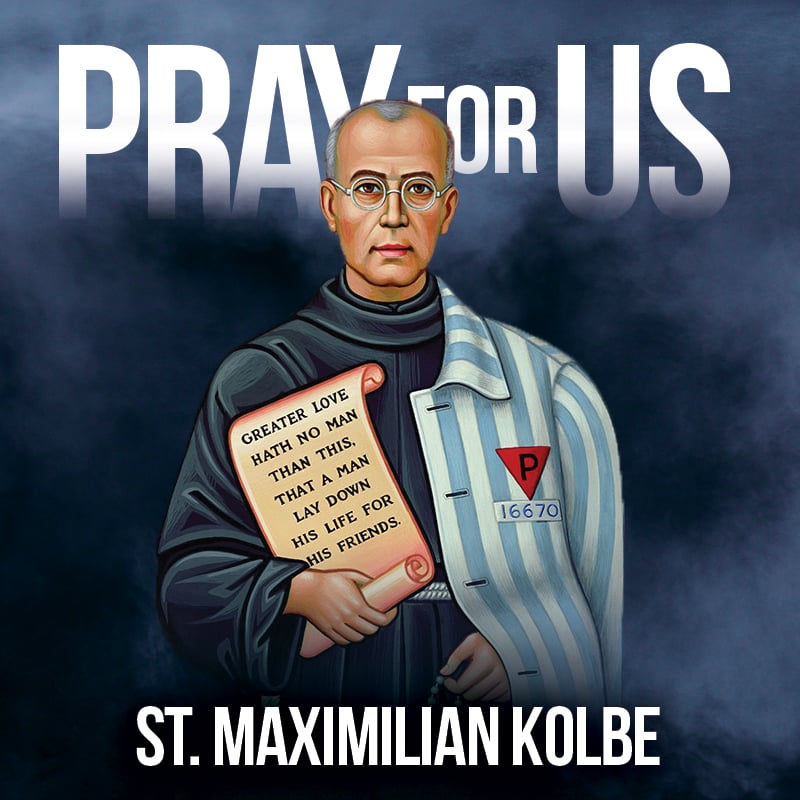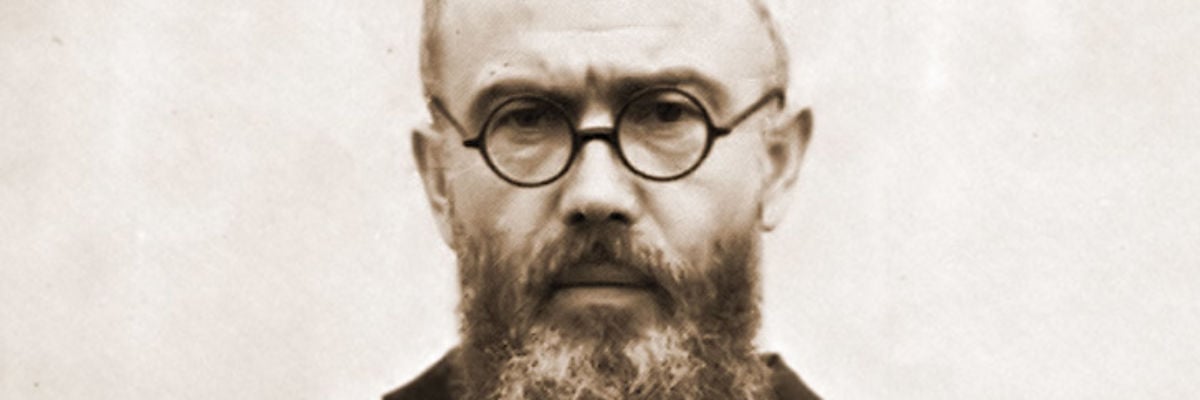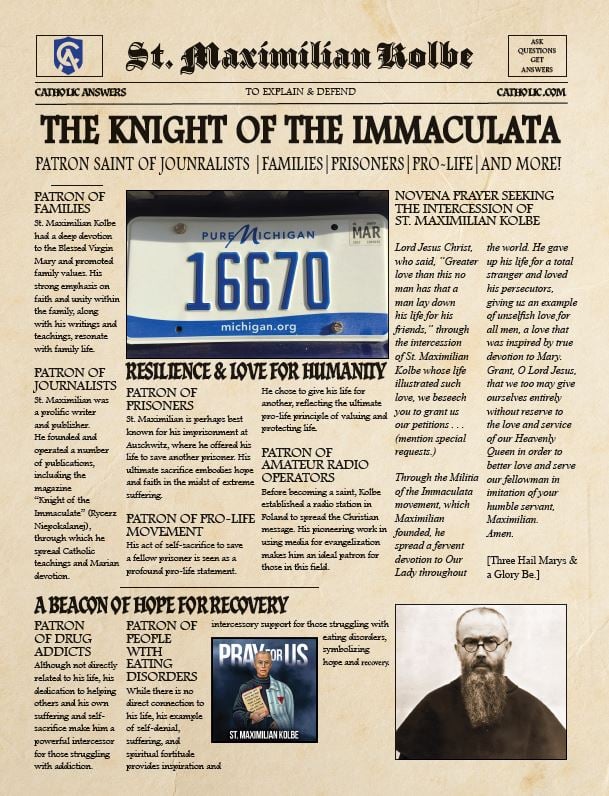
Who Is St. Maximilian Kolbe?
St. Maximilian Kolbe, a Polish Conventual Franciscan friar, is a beacon of selfless love centered in Jesus Christ, as lived through a total consecration to Christ’s Mother, the Immaculate Virgin Mary. Kolbe’s witness as a journalist, apologist, and missionary culminated in his martyrdom during World War II, and he has inspired countless faithful around the world. Let’s delve into the story of this remarkable saint, his unwavering faith, and his ultimate sacrifice.

Key Information about Saint Maximilian Kolbe
Birth Date: January 8, 1894, born Raymond Kolbe
Feast Day: August 14
Death: August 14, 1941
Beatification: October 17, 1971, by Pope Paul VI
Canonization: October 10, 1982, by Pope John Paul II
Patron Saint of: Journalists, families, prisoners, the pro-life movement, the chemically addicted and those with eating disorders
Early Life and Spiritual Journey
Born on January 8, 1894, in Poland—then part of the Russian Empire—Raymond Kolbe grew up in a devout Catholic family. From a young age, he exhibited a deep love for the Virgin Mary. When he was about ten, after his mother exclaimed what would become of him, a troubled Raymond prayed to the Blessed Mother. She appeared to him holding two crowns: a white one signifying purity and a red one symbolizing martyrdom. Mary asked the boy which one he would choose, and young Kolbe earnestly replied, “I choose both.” This vision profoundly shaped his life and spiritual mission.
Raymond, along with his brother Francis and, eventually, his younger brother Joseph, joined the Conventual Franciscans, and he took the name Maximilian in 1910. Kolbe’s zeal for learning led him to Rome, where he earned doctorates in both philosophy and theology. While in Rome, Maximilian also founded the Militia of the Immaculate, an apostolate dedicated to advancing the reign of the Sacred Heart of Jesus through a total consecration to his Immaculate Mother, and also countering anti-Catholic movements, particularly the Freemasons.
Devotion to the Immaculate Virgin Mary
St. Maximilian Kolbe’s dedication to the Immaculate Conception was unwavering. He tirelessly worked to spread Marian devotion through various means, including publishing a monthly magazine, Rycerz Niepokalanej (Knight of the Immaculate), whose circulation would peak at one million in 1938. Kolbe also established the “City of the Immaculate” (Niepokalanów), a Franciscan monastery in Poland dedicated to the Virgin Mary. His goal was to convert sinners and bring them closer to Jesus through Mary, including as a missionary to Japan from 1930–1936, where he established the Mugenzai no Sono (Garden of the Immaculate) in Nagasaki.
World War II and Ultimate Sacrifice
When World War II erupted, Kolbe’s monastery became a refuge for thousands of displaced people, including Jews. Given his steadfast faith and commitment to serving others, the Nazis arrested him in 1941, eventually sending him to Auschwitz, a notorious death camp Hitler’s regime had established in Poland.
At Auschwitz, St. Maximilian Kolbe’s gift of self reached its zenith. In July 1941, a prisoner escaped, prompting the Nazis to select ten men—whom they would starve to death in retaliation. One of the chosen men, Franciszek Gajowniczek, pleaded for his life, lamenting what would happen to his wife and children. Kolbe stepped forward to take the man’s place, thereby personifying a most poignant example of Christ-like love (John 15:13).
On August 14, 1941, on the eve of the Solemnity of the Assumption of the Blessed Virgin Mary, and after Kolbe had endured two weeks without food or water, the Nazis executed the saint with an injection of carbolic acid. Kolbe’s martyrdom highlights the depth of his faith and unwavering commitment to living out the Gospel’s message of love and sacrifice.
Greater love has no man than this, that a man lay down his life for his friends.
John 15:13
Canonization and Legacy
St. Maximilian Kolbe’s extraordinary life and death have led to his being invoked widely as an intercessor. Pope St. Paul VI beatified Kolbe in 1971. Pope St. John Paul II canonized him on October 10, 1982. In his canonization homily, John Paul II, himself a native of Poland, declared Kolbe a “martyr of charity.”
Novena Prayer St. Maximilian Free PDF Download
What Is St. Maximilian Kolbe a Patron Saint of?
St. Maximilian Kolbe has been designated as the patron saint of various causes due to his life, actions, and the circumstances of his death, each symbolizing aspects relevant to these groups: journalists, families, prisoners, and others. Saints are patrons of people who do certain things or are having certain struggles, as opposed to a patron “of” things. For example, patron saints are patrons of certain types of people versus certain types of causes.
Quotes of St. Maximilian Kolbe
Kolbe’s spiritual insights continue to inspire. Here are a few notable quotes of St. Maximilian Kolbe:
“Hate is not creative. Only love is creative.”
“The most deadly poison of our time is indifference.”
“For Jesus Christ, I am prepared to suffer still more.”
“Let us remember that love lives through sacrifice and is nourished by giving.”
“Through the Immaculata to Jesus.”
“No one’s conversion is impossible.”
Places of Devotion
Many Catholic churches worldwide bear his name, fostering devotion to this modern martyr. In addition, the St. Maximilian Kolbe Shrine is located in Niepokalanów, Poland, about twenty-five miles west of Warsaw. This shrine is dedicated to preserving the memory and legacy of St. Maximilian.
The Essence of Christian Love
St. Maximilian Kolbe’s life exemplifies the essence of Christian love and sacrifice. His unwavering commitment to Jesus through Mary, culminating in his heroic martyrdom during World War II, serves as a testament to the power of selfless love and the enduring strength of faith. His legacy continues to inspire and guide the faithful, reminding us that true devotion often comes with a call to profound sacrifice.
When we celebrate the feast day of St. Maximilian Kolbe, we reflect on his life and strive to emulate his deep faith and dedication to Jesus and Mary. Let his story remind us that, even in the darkest times, the light of Christ’s love can shine brightly through our actions (see 2 Cor. 12:8–10).
Additional Resources
Quick Q & A – Was St. Maximilian Kolbe truly a martyr?
Shameless Popery Channel – Joe Heschmeyer explains how the Saints prove Christianity (plus tells of the courage of St. Maximilian at 37 minutes into the video).
From Our Shop
Saint Maximilian Kolbe: A Hero of the Holocaust




